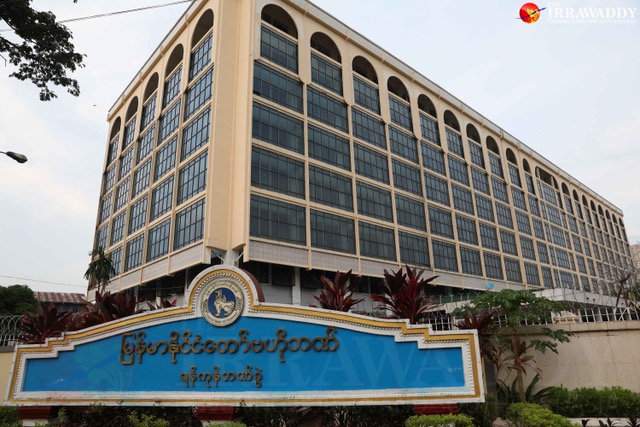This week the government and business chiefs have been rushing to prepare for the impact of COVID-19 after Myanmar confirmed three cases in two days.
Food associations are planning to sell or donate to those on low wages to control market prices because of panic-buying after the virus confirmations.
The Central Bank of Myanmar also cut its interest rates again to boost the country’s economy which has been impacted by COVID-19.
Meanwhile, overland trade with China is returning to normal as it readjusts to the falling value of the yuan.
In other news, Suzuki says it will be constructing another vehicle factory and Mandalay’s industrial zone is hoping to expand.
Myanmar Rice Federation moves to control prices
Myanmar Rice Federation (MRF) is planning to sell rice, cooking oil and salt in industrial zones where most low-paid workers live. It will use wholesale prices and loans as costs are rising amid panic-buying after Myanmar announced three cases of COVID-19.
“Please buy as much as is required. Panic-buying can cause problems. Many shops are selling goods at reasonable prices,” U Nay Lin Zin of the COVID-19 Emergency Response Taskforce formed by the MRF told The Irrawaddy.
The MRF said the public can report retailers selling overpriced rice.
“Because of panic-buying, prices have risen but wholesale prices have not changed,” said U Myint Kyu, chairman of the Myanmar Edible Oil Dealers’ Association.
Retail associations are discussing donations to factory staff who have recently been made unemployed.
Central bank cuts interest rates again
The Central Bank of Myanmar (CBM) has cut interest rates by an additional 1 percent to boost the economy.
The CBM first cut 0.5 percent from interest rates on March 12.
Interest rates are falling from 9.5 percent to 8.5 percent, while the maximum lending rate will be lowered from 12.5 to 11.5 percent for collateralized loans and from 15.5 percent to 14.5 for non-collateralized loans.
The CBM reassured citizens that banking services, including mobile banking and cash machines, will continue to operate. But some of the government’s mechanisms were stopped or suspended after the coronavirus cases were reported.
The economy is declining significantly as clothing, tourism and manufacturing suffer from COVID-19, said the Union of Myanmar Federation of Chambers of Commerce and Industry.
Yuan falls as border trade returns
Border trade with China has recovered to normal but the value of the Chinese yuan has fallen.
There were 199 kyats to the yuan on March 22, down from 205 kyats.
Before COVID-19, 210 kyats bought a yuan on the border. The change makes imports cheaper but might make Myanmar’s exports less competitive.
“Trade is recovering. Chinese traders are visiting our wholesale rice center,” said U Min Thein, a member of the center.
U Nanda, director of the Muse Border Trade Zone, said daily bilateral border trade, including natural gas, totaled US$1.4 million (1.9 billion kyats).

Mandalay’s industrial zone to expand
The industrial zone in Mandalay is due to expand as more firms look to build factories, according to the Myanmar Times.
“Many investors want to buy plots near the industrial zone. An extension is urgently needed to attract foreign investors,” said U Nay Win, vice chairman of the Industrial Zone Administrative Committee.
He said firms from Japan, Germany, South Korea and other countries were interested in investing in Mandalay.
Currently, 1,180 factories are operating in the 736-hectare industrial zone.
Suzuki unveils factory plans
Suzuki Motor Corporation said on Monday it would build a car plant with the “completely knocked down” (CKD) system, including welding, painting and assembly of cars.
It also has a factory in Thilawa Special Economic Zone that has been assembling vehicles in a “semi-knocked down” (SKD) operation where partially assembled parts are put together.
Suzuki said it wanted to construct a factory to create a wide-ranging automobile market in Myanmar. The factory is due to open next year and expected to produce 40,000 vehicles per year, the giant manufacturer said.
U Myo Zin Win, secretary of Myanmar Automobile Manufacturers and Distributors Association, told The Irrawaddy that he welcomed Suzuki’s decision and that it would encourage other firms to set up in Myanmar.
Suzuki first invested in Myanmar in 1998 and has currently channeled approximately US$35 million (48 billion kyats) into the country.
Yoy may also like these stories:
The Irrawaddy Business Roundup
Myanmar Speaker Rejects Call to Summon Military-Majority Security Council to Address COVID-19

















